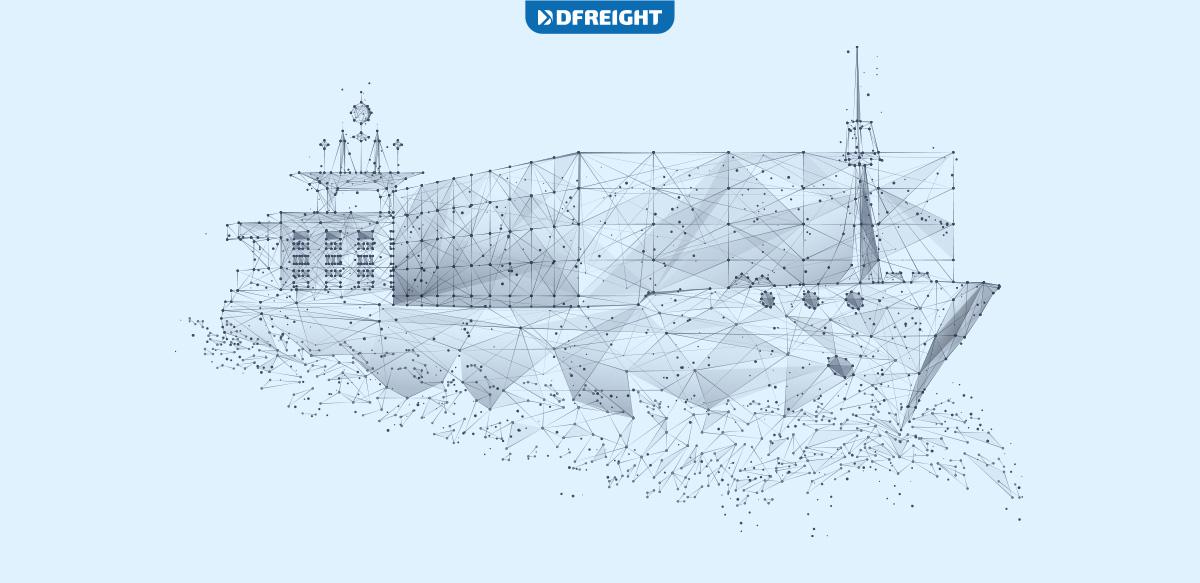The practice of coordinating and controlling the transportation of products using digital technologies is known as digital freight forwarding. This involves tracking shipments, coordinating with suppliers and customers, and managing documentation using internet tools. The process of shipping goods can be made more effective and streamlined using digital freight forwarding. It can also save time and money for businesses by decreasing the need for manual labor. Let’s learn more about this way of transportation that makes the forwarding procedure easier.
Table of Contents
The Role of Digital Freight Forwarding in the Logistics Industry
The rise of digital freight forwarding (DFF) has been a game-changer for the logistics industry and is playing an increasingly important role in this business. By automating many of the tasks associated with managing freight shipments, digital freight forwarders are able to provide their clients with a more efficient and cost-effective service. The traditional freight forwarding process is often time-consuming and prone to errors. This is because it relies heavily on manual tasks, such as tracking shipments, preparing documentation, and chasing up payments. Digital freight forwarders are able to automate many of these tasks, which frees up their time to provide a more personalized service to their clients.
Digital freight forwarding is transforming the logistics industry by making it more efficient and easier to track and manage shipments. By automating many of the tasks of a freight forwarder, digital freight forwarders are able to provide their clients with real-time tracking of their shipments, as well as access to a host of other data that can help them manage their supply chains more effectively.
In addition to providing their clients with more efficient service, digital freight forwarders are also able to offer competitive pricing by leveraging the power of technology. By using data to identify trends and optimize shipping routes, digital freight forwarders can often offer their clients significant savings on their shipping costs.
As the logistics industry continues to evolve, digital freight forwarders are likely to play an increasingly important role in helping businesses manage their supply chains more effectively. With their ability to provide real-time tracking and data-driven insights, digital freight forwarders can help businesses save time and money, and improve their overall operations.
The Benefits of Digital Freight Forwarding
As the world progresses, more and more businesses are conducted online. The freight forwarding industry is no different. In recent years, there has been a shift from traditional freight forwarding methods to digital freight forwarding. Digital freight forwarding offers many benefits over traditional freight forwarding methods. Perhaps the most obvious benefit is that it is much faster and more efficient. With digital freight forwarding, businesses can get their products shipped faster and with less hassle.
Digital freight forwarding is an important part of the global logistics and transportation industry. By automating and digitizing the process of freight forwarding, businesses can improve efficiency and accuracy while reducing costs. There are many benefits of digital freight forwarding, including:
- Increased Efficiency: Automating the process of freight forwarding can help to improve efficiency and accuracy. By digitizing the process, businesses can reduce the time it takes to book shipments, track shipments, and invoice.
- Reduced Costs: Automating the process of freight forwarding can help businesses to reduce costs. By reducing the need for manual labor, businesses can save on labor costs. In addition, businesses can save on paper costs by switching to electronic documentation.
- Improved Customer Service: Automating the process of freight forwarding can help businesses to improve customer service. By providing customers with up-to-date information on their shipments, businesses can improve customer satisfaction. In addition, businesses can use digital freight forwarding to provide customers with tracking information and notifications.
- Increased Visibility: Automating the process of freight forwarding can help businesses to increase visibility. By providing businesses with real-time tracking information, businesses can improve the visibility of their shipments. In addition, businesses can use digital freight forwarding to create reports and analytics.
- Improved Security: Automating the process of freight forwarding can help businesses to improve security. By using digital signatures and encryption, businesses can protect the confidentiality of their shipments. In addition, businesses can use digital freight forwarding to create tamper-proof records.
With all of the advantages above, you can see how critical this issue is in the transportation sector, and you should also be aware that failing to use technology and embrace modernity may result in irreversible damage. Overall, digital freight forwarding offers many benefits over traditional freight forwarding methods. businesses that switch to digital freight forwarding can expect faster, more efficient, and more accurate shipping. Additionally, digital freight forwarding is more cost-effective and environmentally friendly than traditional freight forwarding.
The Challenges of Digital Freight Forwarding
The digital freight forwarding landscape is constantly evolving and becoming more complex. This presents challenges for companies who must keep up with the latest changes and technologies in order to remain competitive.
- It is still a relatively new concept. This means that there are not a lot of companies that are using this technology yet. This can make it difficult to find a company that is able to provide the services that you need.
- It can be expensive. This is because you need to purchase the technology and then pay for someone to maintain it. This can be a significant cost for a small business.
- It can be complicated. This is because you need to have a good understanding of how the technology works in order to use it effectively. This can be difficult for someone who is not familiar with the technology.
- Managing the increasing amounts of data that are generated can be challenging. This data must be stored, organized, and analyzed in order to be used effectively. Additionally, companies must be able to integrate this data with other systems in order to make informed decisions about shipments.
- Dealing with the complex routing options that are available is another challenge. There are many different carrier options and service levels, which can make it difficult to choose the best option for each shipment. Additionally, the increasing use of multimodal transport options (e.g., ship, plane, train, truck) adds another layer of complexity to the routing decision.
- Finally, digital freight forwarders must be able to provide value-added services that go beyond simply providing transportation. This may include providing visibility into the supply chain, managing inventory, and providing other services that help the customer manage their shipments.
Despite the challenges, digital freight forwarding is here to stay. It offers many advantages over traditional methods of freight forwarding and is quickly becoming the preferred choice for many businesses. In order to stay ahead of the curve, freight forwarders need to be prepared to embrace new technologies and adapt to the changing landscape of logistics.
The Future of Digital Freight Forwarding
The future is absolutely exciting, the industry is rapidly evolving and there are many new and innovative technologies that are being developed to make the process of freight forwarding more efficient and effective. One of the most exciting developments is the use of blockchain technology. Blockchain is a distributed database that allows for secure, transparent, and tamper-proof transactions. This could potentially revolutionize the freight forwarding industry by reducing costs and increasing transparency and efficiency.
Another exciting development is the use of artificial intelligence (AI) and machine learning. These technologies can be used to automate many of the tasks involved in freight forwardings, such as route planning, tracking, and documentation. This would free up time for freight forwarders to focus on more strategic tasks, such as developing relationships with clients and carriers.
The use of digital technologies is also transforming the way that freight is being shipped. The rise of e-commerce has led to a boom in the demand for express shipping services. This is because more and more people are buying goods online and expecting them to be delivered quickly and efficiently. Freight forwarders are rising to the challenge by investing in new technologies that allow them to offer express shipping services at competitive rates.
Overall, the future of digital freight forwarding is very exciting. There are many new and innovative technologies that are being developed to make the process more efficient and effective. This is good news for freight forwarders, as it means that they will be able to offer even better services to their clients. In an article regarding the future of this business, the technologies that can serve this industry are discussed in detail.
Why Businesses in UAE Should Use Digital Freight Forwarding
In the United Arab Emirates, digitalization is playing an increasingly important role in the economy and society. The UAE has been investing heavily in digital infrastructure and initiatives in recent years, and the results are starting to show. The UAE is now one of the most connected countries in the world, with near-universal access to high-speed broadband. This has been a key driver of the country’s digital transformation, which is being led by the government’s ambitious Vision 2021 strategy.
Under this strategy, the UAE aims to become one of the world’s top 10 digital nations by 2021. This means making significant progress in areas such as e-government, e-commerce, digital skills, and cyber security.
As the UAE modernizes, not keeping up with this wave will eliminate your traditional business from the competition. Traditional freight forwarders will need to adapt to the changing landscape. They will need to invest in new technologies and approaches, and they will need to find ways to differentiate themselves from the new players in the market. But, if they are able to do this, they will still have a place in the future of global trade.
Conclusion
As the world increasingly moves online, businesses are looking for ways to digitize their operations. One area that is seeing a lot of growth is digital freight forwarding. This new way of shipping goods offers many benefits over traditional methods, including lower costs, faster shipping times, and more transparency. For businesses that want to stay ahead of the curve, digital freight forwarding is the way to go.
If you’re looking for a digital freight forwarding company that can help you streamline your shipping process and save you time and money, look no further than DFreight. We offer a comprehensive suite of digital freight forwarding services that will make your shipping operation more efficient and cost-effective. Contact us today to learn more about how we can help you.
FAQs
Is digital freight forwarding popular in the UAE?
It is safe to say that along with modernization in other fields, digital freight forwarding is definitely in progress in the UAE, with many companies offering digital solutions to their clients.
How can I get started with digital freight forwarding?
Businesses can get started with digital freight forwarding by implementing a software solution that offers the key components of digital freight forwarding.
What are the key components of a digital freight forwarding solution?
A digital freight forwarding solution typically includes a software platform that is used to track and manage shipments, automate documentation, and provide real-time visibility into the supply chain.














